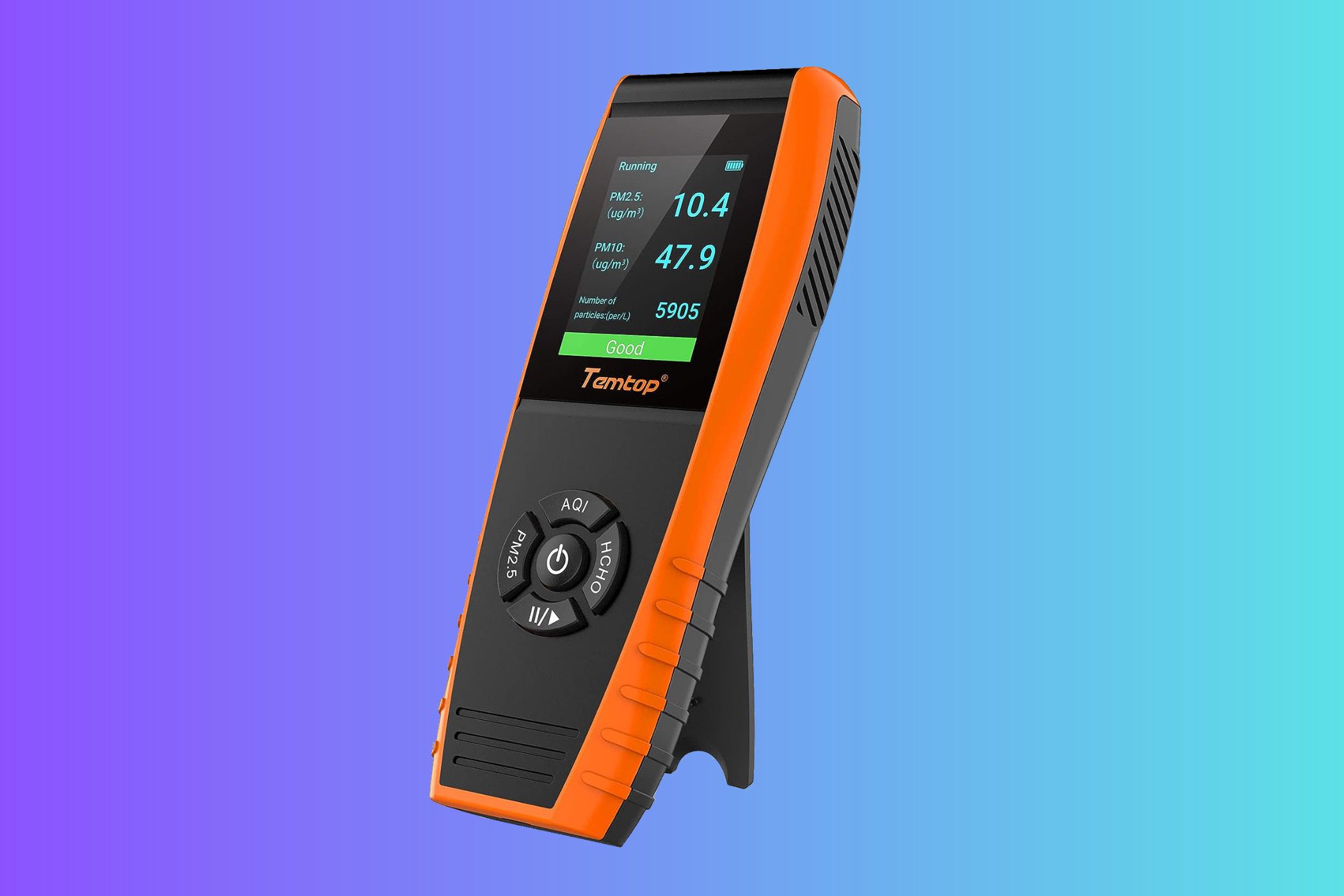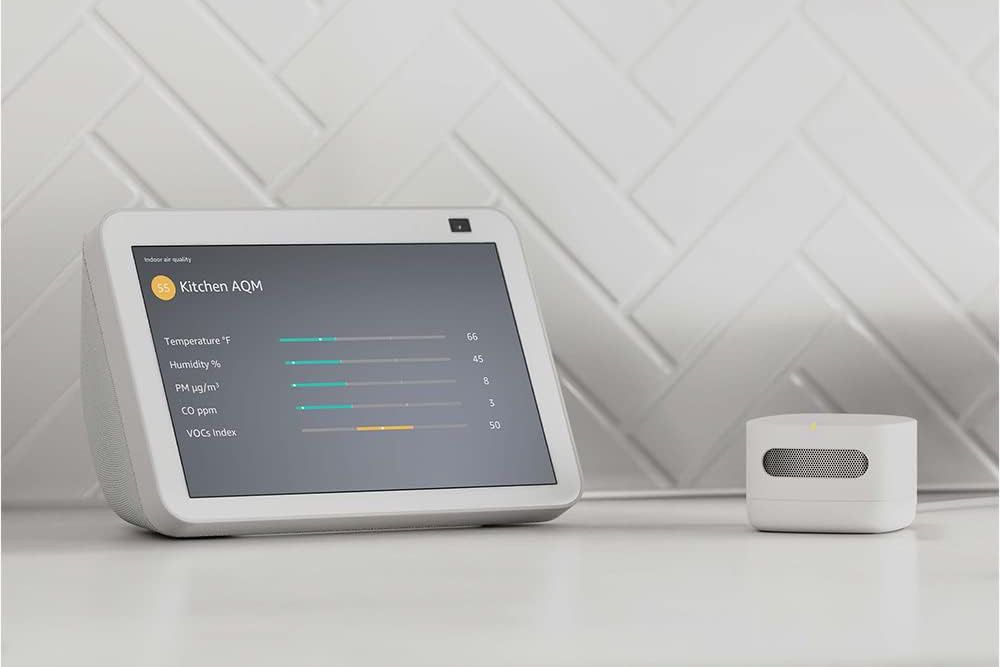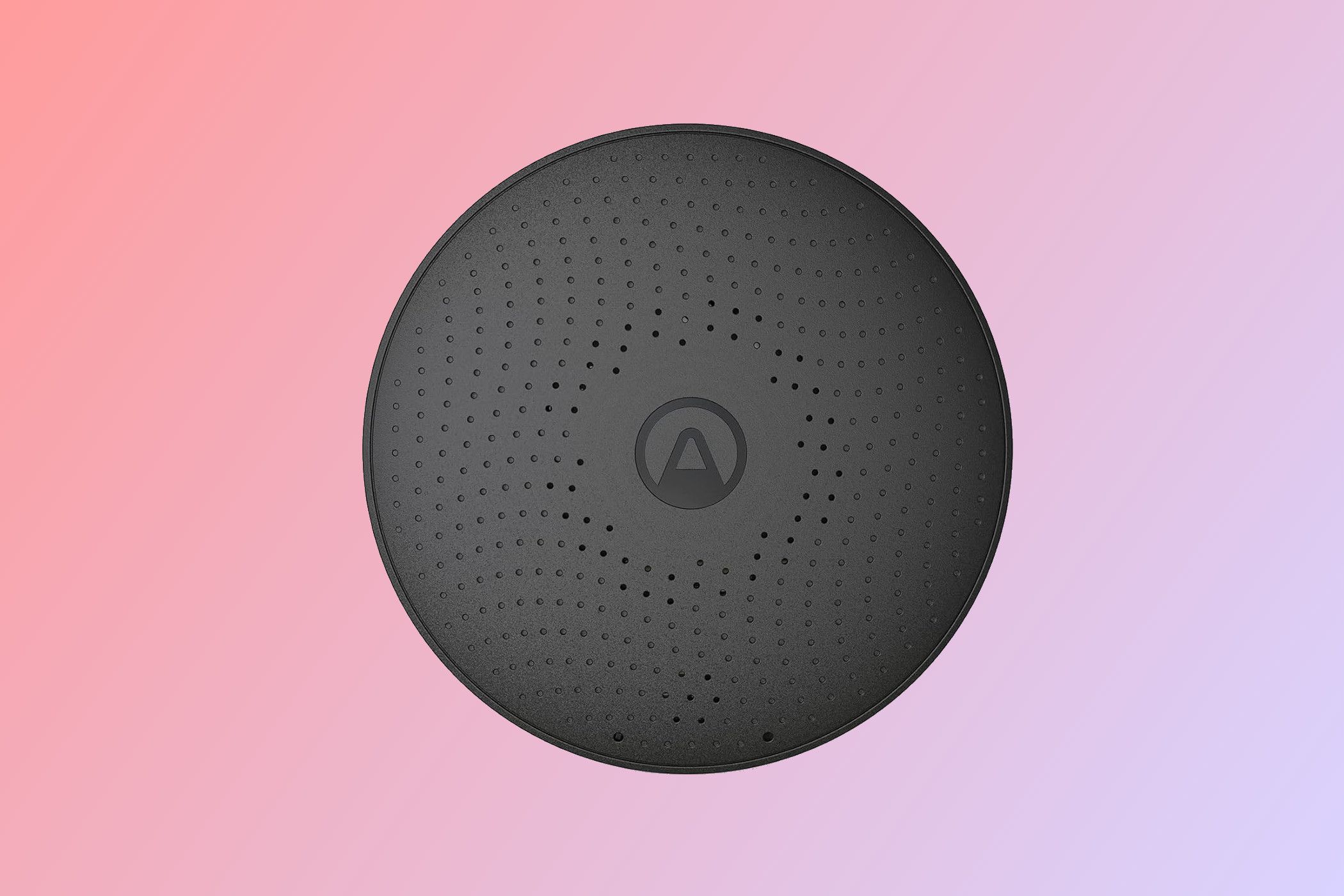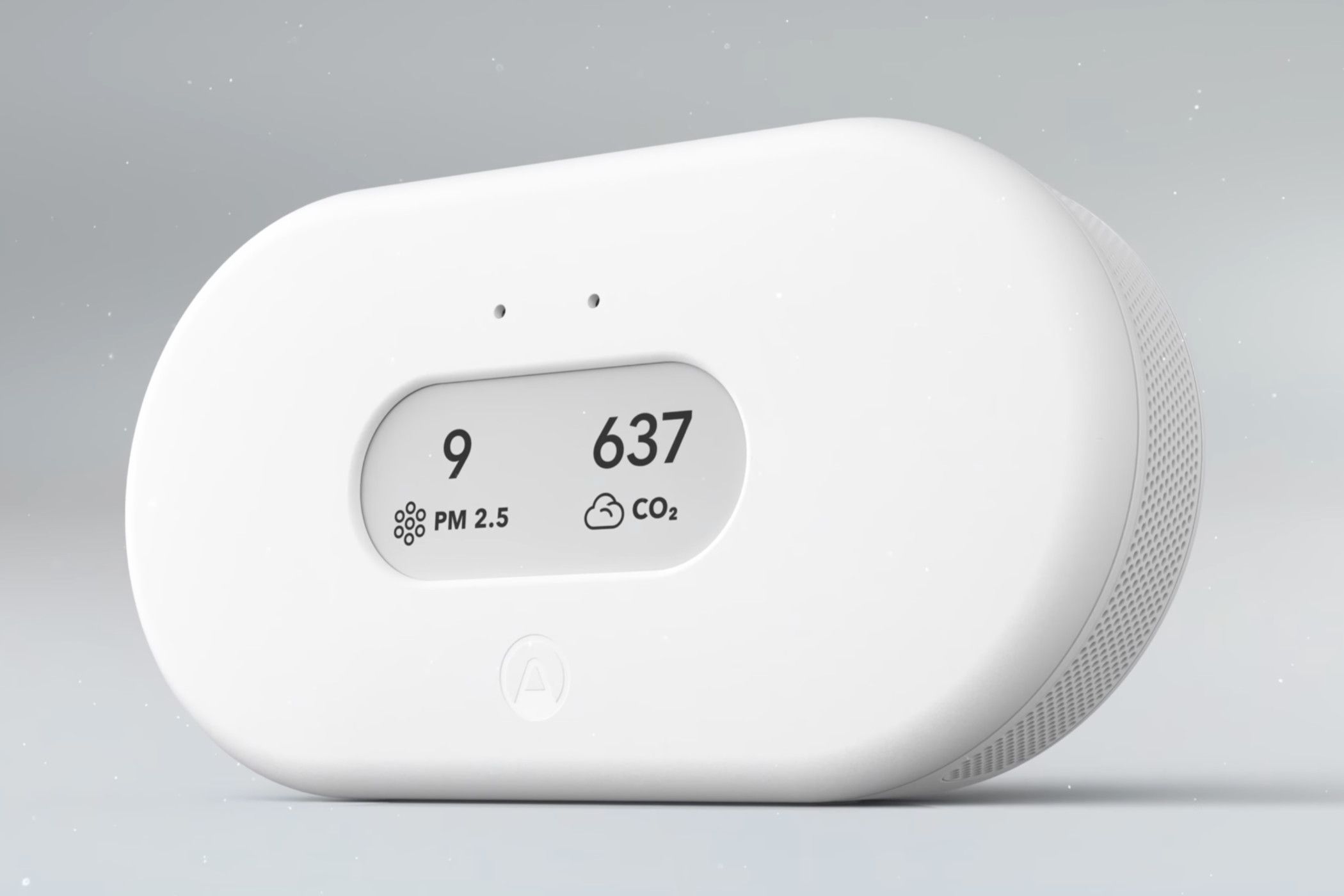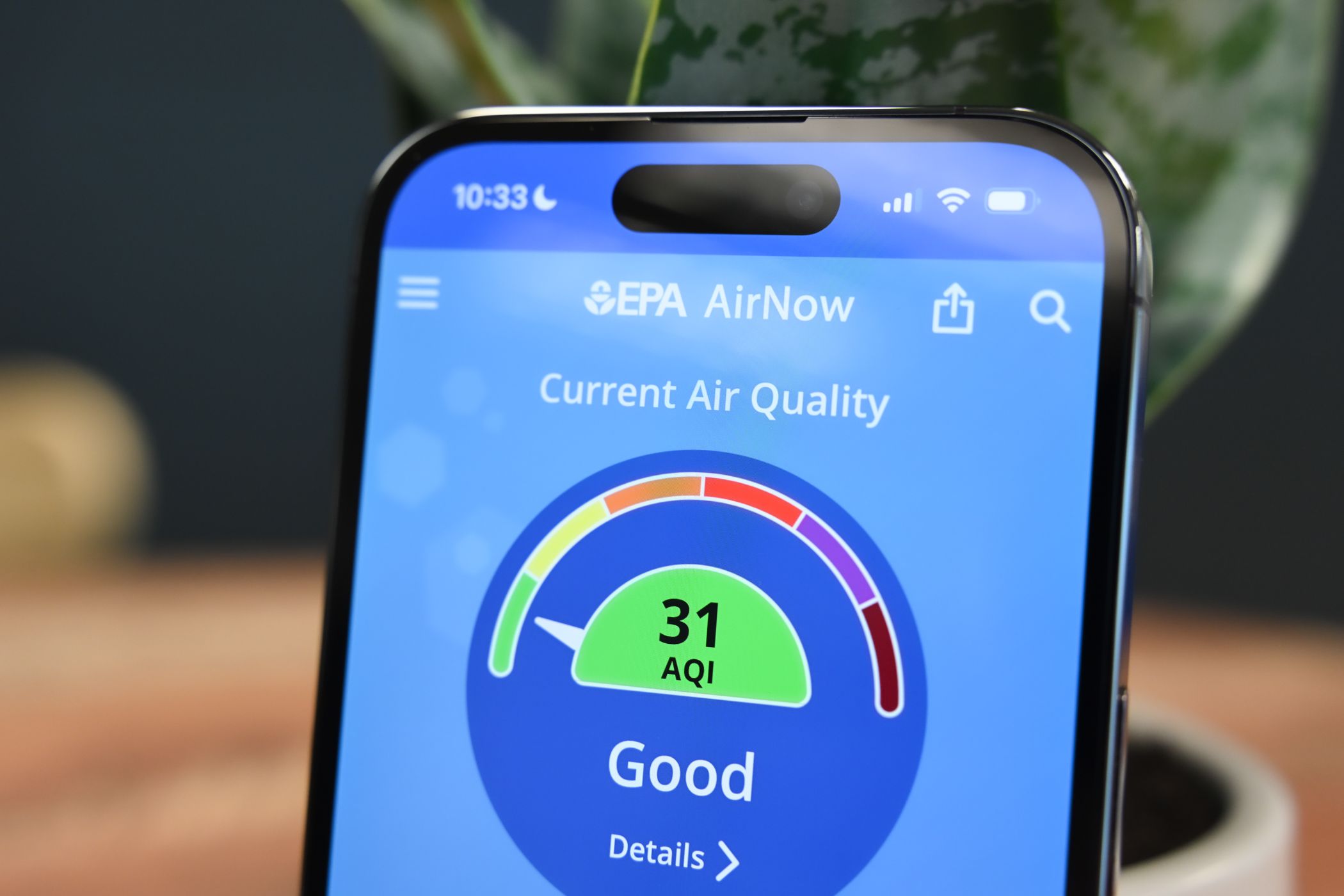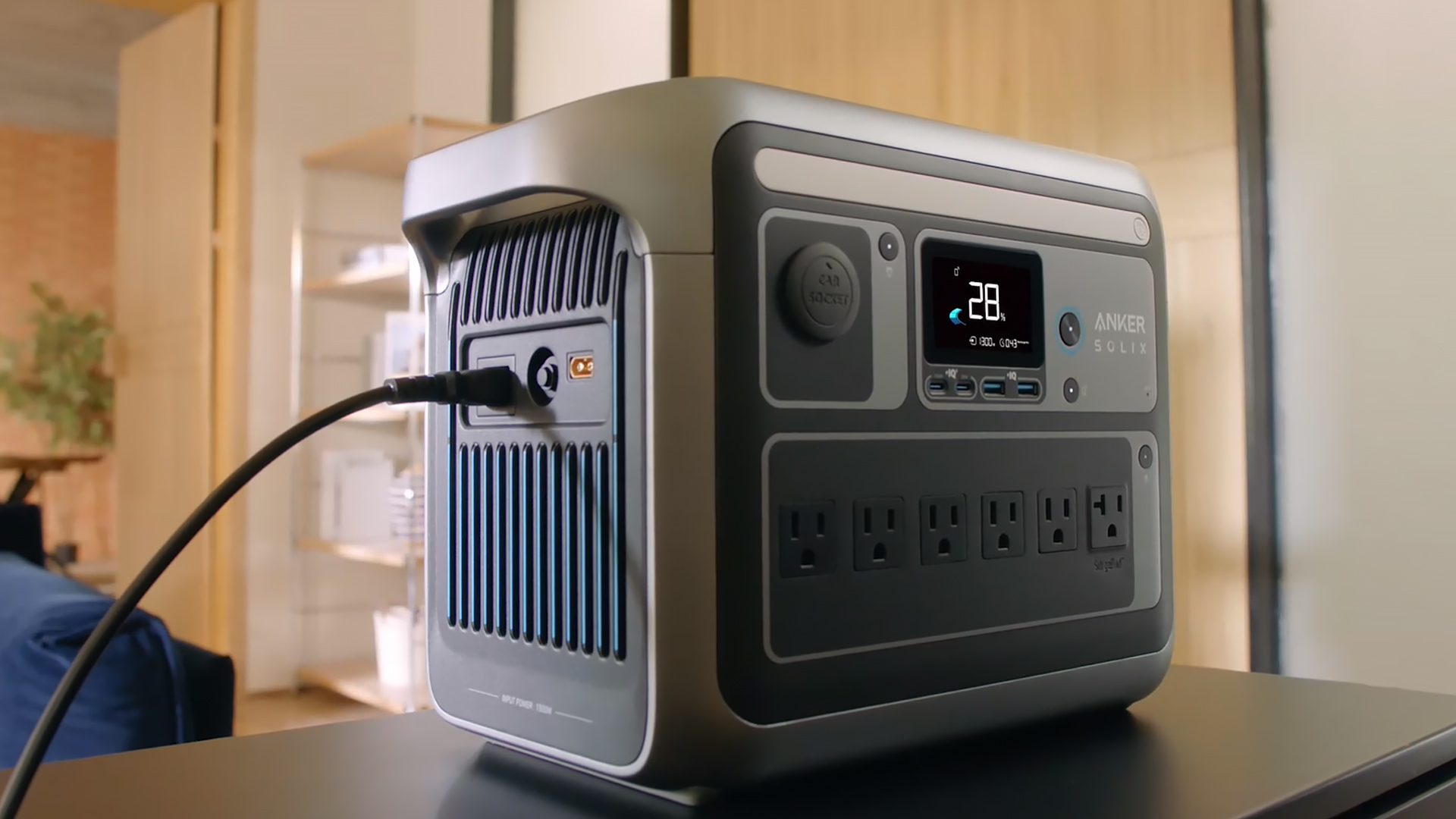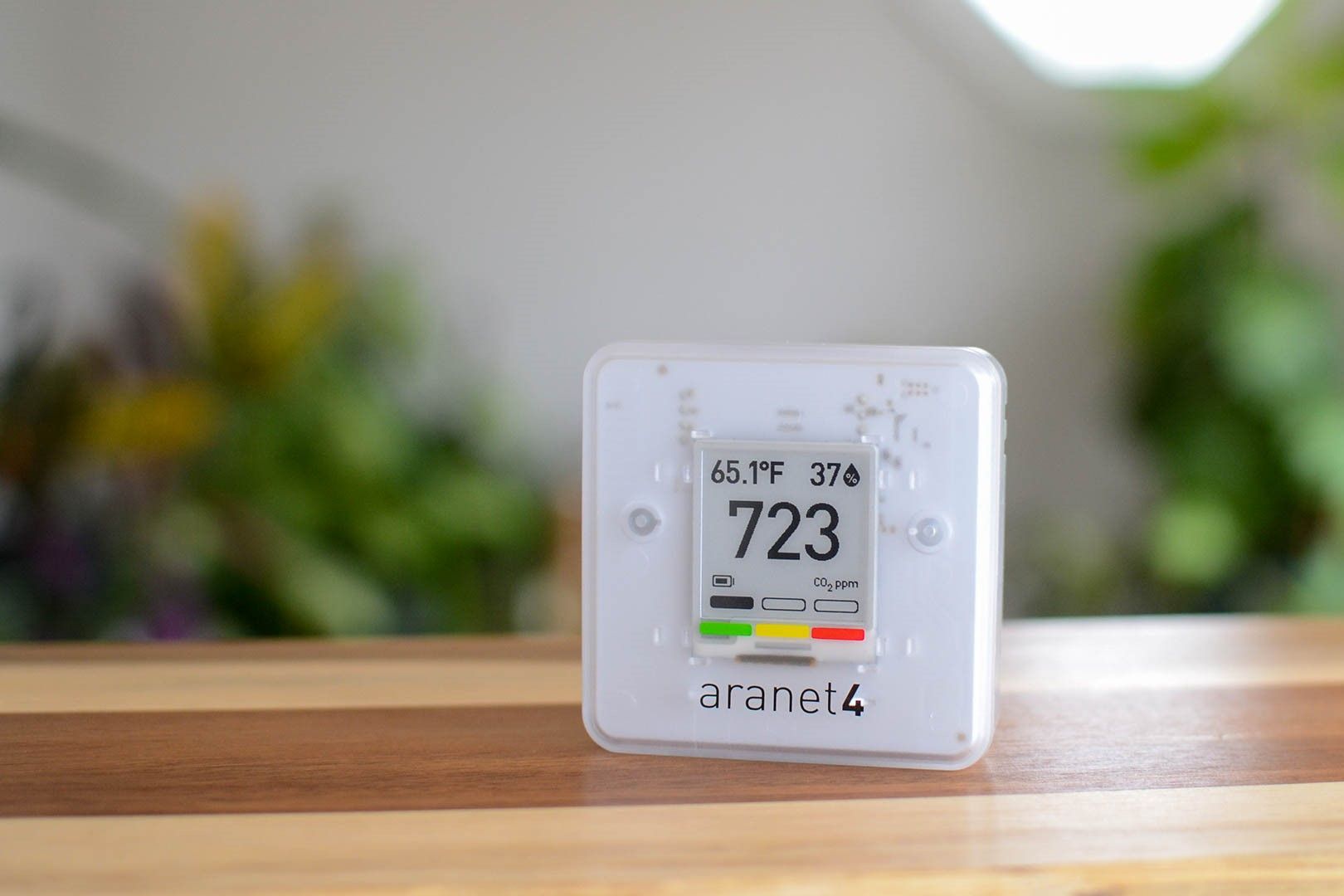
Are you worried about the presence of harmful gases in your home? Wondering if your office is well-ventilated or not? An air quality monitor can help you answer these queries and more.
-
Temtop LKC-1000S+
Best Air Quality Monitor Overall
-
Amazon Amazon Smart Air Quality Monitor
Best Budget Air Quality Monitor
-
Airthings Airthings 2930 Wave Plus
Best Smart Air Quality Monitor
-
Airthings 2960 View Plus
Most Comprehensive Air Quality Monitor
What to Look for in an Air Quality Monitor in 2023
Air quality monitors measure all sorts of environmental factors to help you understand the quality of the air you’re breathing. This information can be put to good use in helping you decide whether your house or office is well-ventilated, what other harmful compounds are in the air, or simply as a data-collecting exercise for those interested.
While an air quality monitor is no substitute for the opinion of a medical professional, some people may find that a better understanding of their home’s atmosphere can help explain and potentially improve some breathing and allergy issues.
There are lots of different types of air quality monitors on the market. Some do a single job, like monitoring carbon dioxide (CO₂) presence in parts-per-million (ppm) or detecting the presence of volatile organic compounds (VOC) like ethane, solvents used in paint, and aerosols like butane and propane. Others do a lot more, like detecting radon (Rn) and formaldehyde (CH₂O), and ascribing an air quality index (AQI) score.
These units also come in a variety of form factors, from portable handhelds to wall-mounted units that look like smoke detectors. Some have built-in displays to show you useful information, while others require the use of a smartphone via an app. Some even integrate with smart home systems like Amazon Alexa and Apple HomeKit.
The more you spend, the more features you get. Let’s take a look at some of the best options on the market right now.
|
How Did We Research |
||
|
Models Evaluated |
Hours Researched |
Reviews Analyzed |
|
25 |
6 |
45+ |
How-To Geek’s product recommendations come from the same team of experts that have helped people fix their gadgets over one billion times. We only recommend the best products based on our research and expertise. We never accept payment to endorse or review a product. Read More »
|
Pros |
Cons |
|---|---|
|
Provides PM2.5 and PM10 measurements, AQI report, and looks for the presence of VOCs and formaldehyde |
No always-on monitoring |
|
Portable, battery-powered form factor |
Requires charging |
|
USB data export to a computer |
The Temtop LKC-1000S+ is a portable air quality monitor that’s ideal for those who don’t need always-on constant measurements. It’s designed for handheld use, though it also has a stand so that you can place it down on a surface while taking a reading. Data collected can be saved for up to three months and exported to a computer via the included USB cable (which is also used for charging).
The instrument measures particulate matter at 2.5 and 10 micrometers (PM2.5 and PM10), looks for both formaldehyde and VOCs, and compiles its measurements into an AQI score. On top of this, it also measures humidity and temperature.
You’ll get around eight to nine hours of standby use with a charge time of around four hours. The manufacturer rates sensor life for up to 20,000 hours. The unit isn’t cheap, but it costs less than many “smart” sensors and has excellent customer reviews. It’s also great for traveling since it’s battery-powered and small enough to throw in a bag.
Looking for something simple you can leave at home? Take a look at the SAF Aranet4. This is also a battery-powered unit, but it uses an e-ink screen to achieve a super-long battery life of up to four years. This monitor measures carbon dioxide levels, which build up in enclosed spaces that aren’t well-ventilated. It also sounds a buzzer to notify you of poor air quality, has a simple traffic-light reading system, and links to the manufacturer’s app for data export.
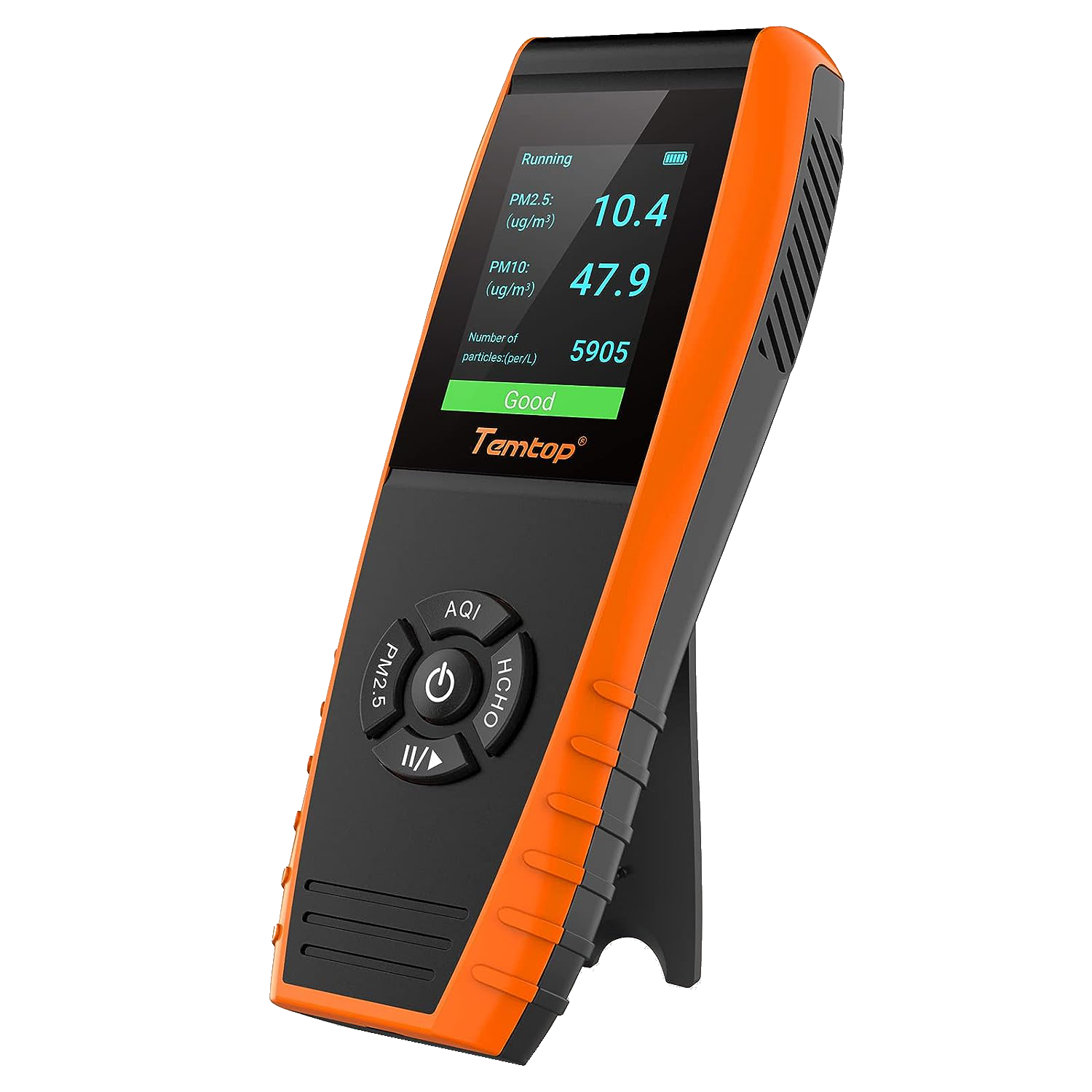

Temtop LKC-1000S+
Best Air Quality Monitor Overall
A portable air quality monitor with USB connectivity, 8-9 hours of standby, and a form factor that’s great for travel with lots of features.
|
Pros |
Cons |
|---|---|
|
One of the cheapest home monitors you can buy |
No display or speaker |
|
Always-on measurements |
Requires the use of Amazon’s Alexa app |
|
Works with Alexa’s Routine feature to automate other smart home devices or sound alerts |
It’s hard to beat the Amazon Smart Air Quality Monitor if you’re on a budget. This always-on device sits in the corner of a room and measures carbon dioxide levels, the presence of particulate matter (PM2.5), and the level of VOCs in the atmosphere, plus humidity and temperature.
At this price range, you don’t get a screen to view readings or a speaker to sound an alarm. You’ll need to use a mobile app or Alexa device to see your measurements, with the ability to get alerts via an Echo on the same network. This has the added benefit of using Alexa’s Routine feature. You can automatically engage devices like fans and air purifiers if the air quality drops to a certain level. Of course, you’ll need compatible devices for this to work.
If you’re looking for something cheap that isn’t smart or dependent on Amazon’s ecosystem, consider the Temtop Portable Air Quality Monitor. There is no connectivity here, just a “dumb” rechargeable unit that measures PM2.5, humidity, and temperature with an AQI score. You don’t get VOC monitoring, but you can buy a two-pack for around the price of the Amazon model above.
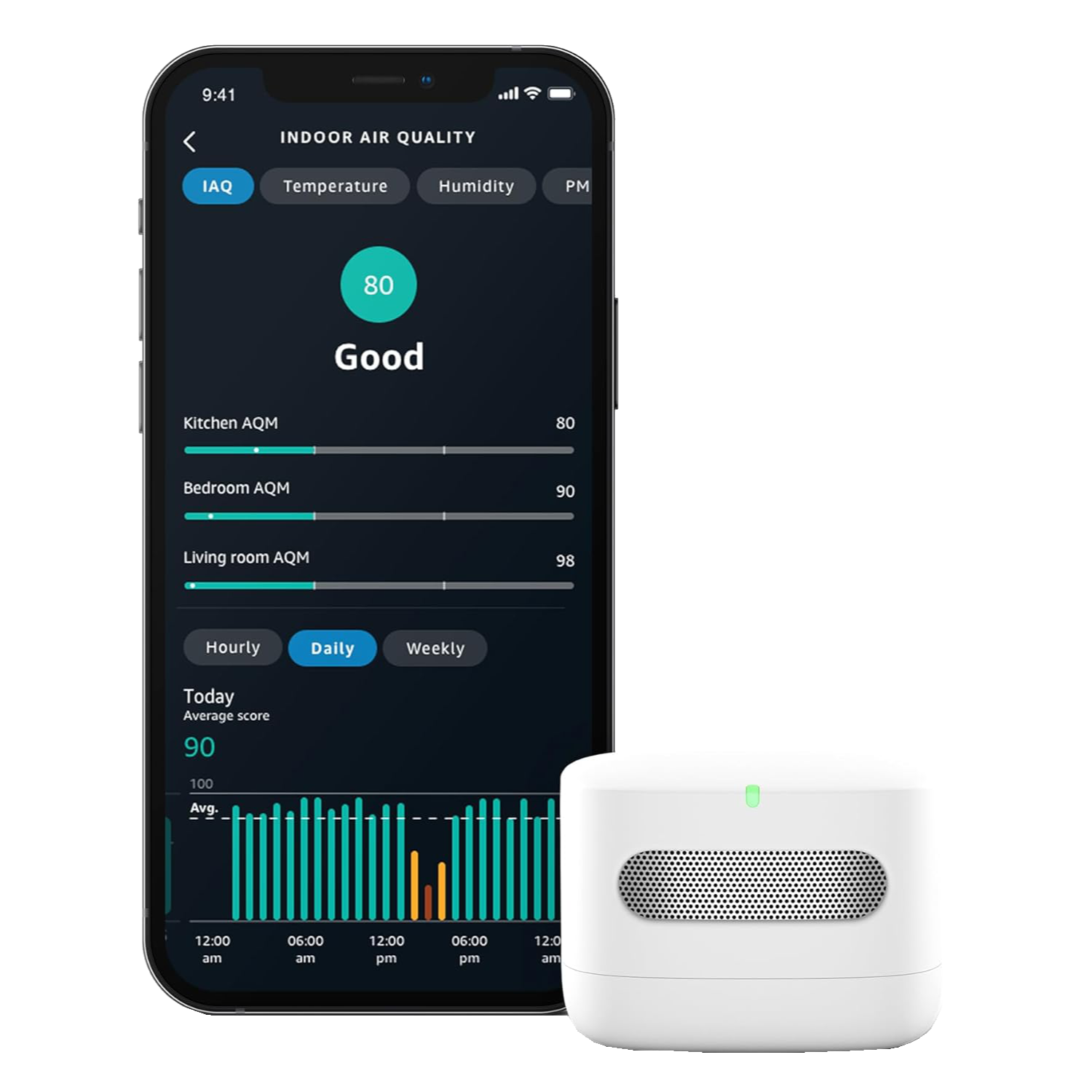

Amazon Smart Air Quality Monitor
Best Budget Air Quality Monitor
$53 $70 Save $17
Amazon’s basic Smart Air Quality monitor provides information about PM2.5, carbon dioxide, and VOCs on the cheap. Use your smartphone and an app to view real-time and historical data and automate other Amazon smart home devices using Routines.
|
Pros |
Cons |
|---|---|
|
Battery-powered (AA) means you can mount it anywhere |
No PM2.5 measurement |
|
Works with Airthings app, Amazon Alexa, and IFTTT |
No display means you have to use a smartphone |
|
Great range of measurements plus a pollen report from Airthings |
No HomeKit, Google Home, or similar support |
The AirThings 2930 Wave Plus is an air quality monitor that’s completely focused on the smart home experience. It’s a wall-mounted unit that takes two AA batteries and works using the Airthings Wave app, Amazon Alexa, and can even take advantage of IFTTT integration to trigger devices and alerts.
This unit measures carbon dioxide levels, humidity, barometric pressure, and temperature. It looks for VOCs and radon and delivers an AQI score. Through the Airthings app, you will get a pollen report for your local area (though the unit itself doesn’t measure this). The main thing the Wave Plus lacks is PM2.5 measurement.
Being battery-powered, you can mount it on any surface or in any room without having to worry about connecting to mains power. Data is collated throughout the day so that you can see how the various levels rise and drop over time. It’s a great choice for those who want smart features and detailed measurements and who aren’t too fussed about having a display.
If you’re a HomeKit or Thread user who is looking for something smart to measure VOCs and temperature, take a look at the Eve Room. It can be used with Apple’s Home app to create automations, but it’s disappointingly limited in terms of measurements.
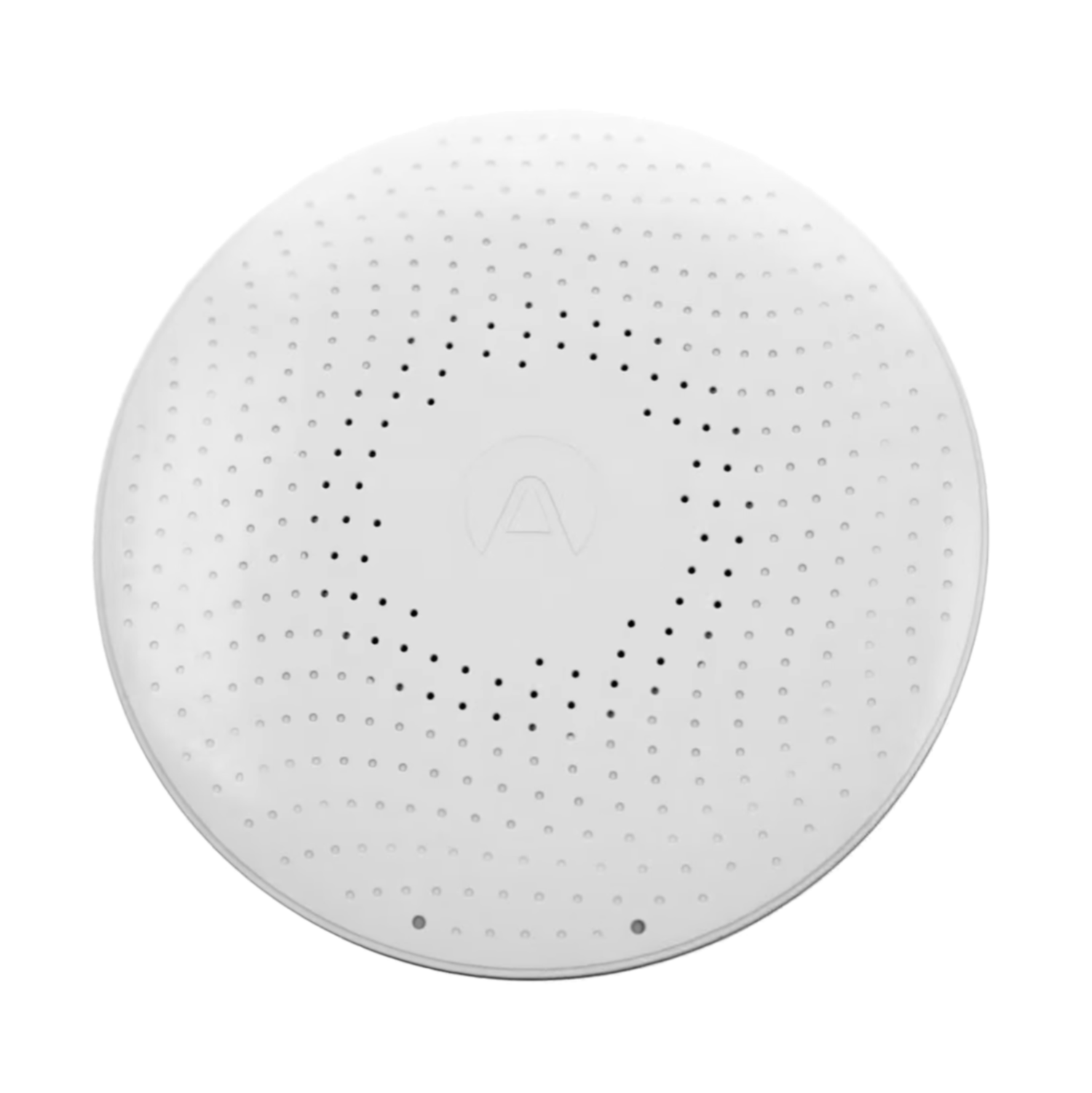

Airthings 2930 Wave Plus
Best Smart Air Quality Monitor
$215 $230 Save $15
Monitor your home for radon, carbon dioxide, VOCs, and more with the Airthings 2930 Wave Plus. Mount anywhere and power the unit with two AA batteries, then access your readings through the Airthings app or connect to Alexa or IFTTT for smart home functionality.
|
Pros |
Cons |
|---|---|
|
Monitors pretty much everything with two years of battery life |
Requires six AA batteries |
|
Works with Airthings, Amazon Alexa, and Homey |
No HomeKit or Google Home integration |
|
Features a customizable e-ink display |
Pricey |
The Airthings 2960 View Plus is a home air quality monitor with a huge array of features. It measures both carbon dioxide and PM2.5 levels, and it looks for VOCs and radon gas. You also get humidity, temperature, and barometric pressure readings. You can see these readings on the customizable e-ink display that’s integrated into the front of the unit.
Like the Wave Plus (above), the View Plus is a battery-powered unit. You’ll need to power it with a whopping six AA batteries, but this nets you around two years of constant monitoring. You can check the data using the Airthings app or use Amazon Alexa and Homey integration to trigger events wherever you are.
Place the View Plus anywhere to get accurate and real-time readings without having to worry about power cables and sockets. You can also register for a free five-year extended warranty.
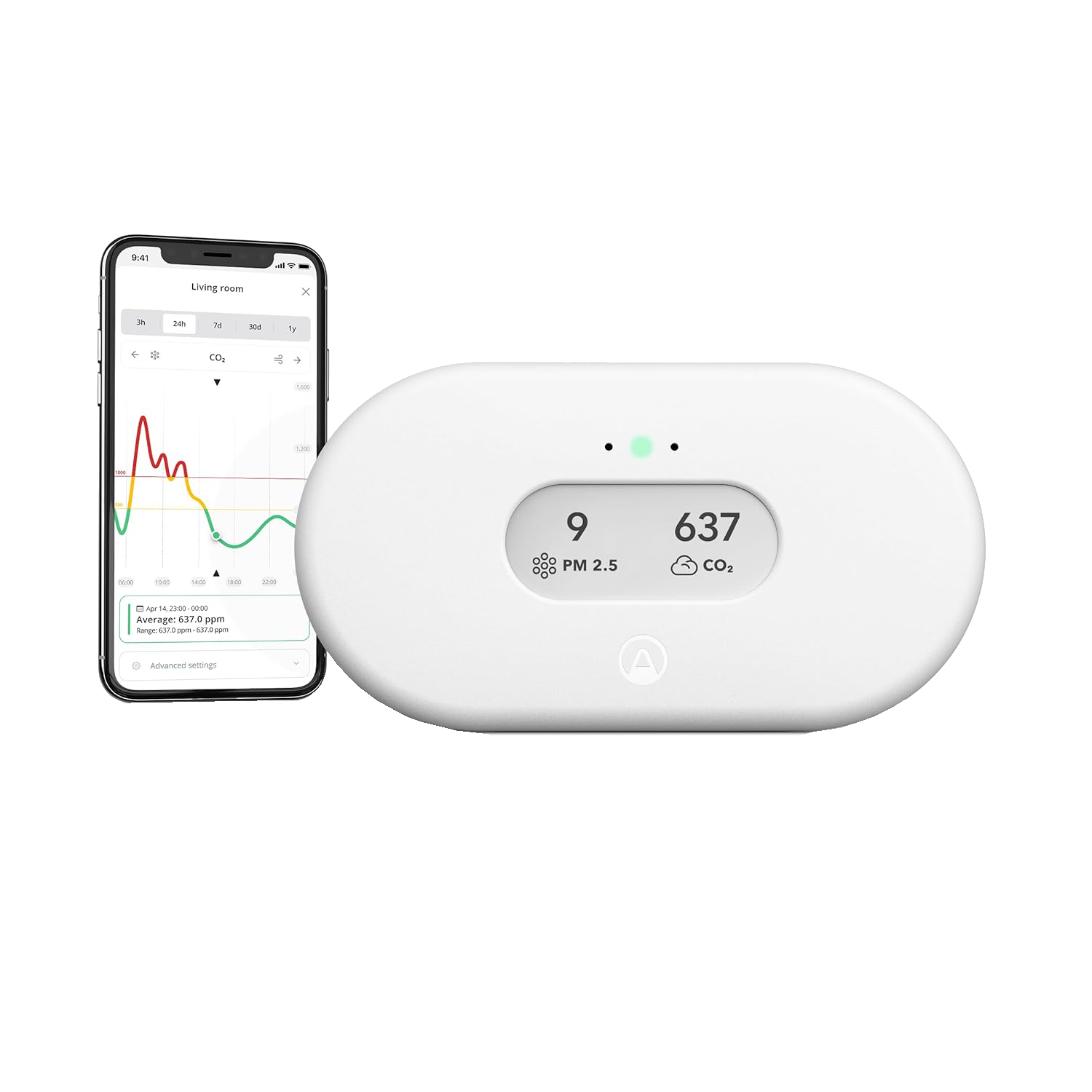

Airthings 2960 View Plus
Most Comprehensive Air Quality Monitor
Airthings 2960 View Plus is one of the most feature-rich air quality monitors for the home. It can monitor PM levels, CO2, VOCs, humidity, temperature, and air pressure.
Best Air Quality Monitor App: AirNow (iPhone, Android)
|
Pros |
Cons |
|---|---|
|
Reliable data sourced from the EPA |
Only works as a monitor for outside conditions |
|
A free download for iPhone and Android |
|
|
Check your immediate area and store others for quick reference |
AirNow is a free app for iPhone and Android that makes it easy to learn more about air quality in your local area. With data sourced from the EPA, AirNow can help you plan outdoor activities based on the AQI. The app even lets you store multiple areas and recall them as you need them.
The downside is that, unlike a dedicated monitor, these measurements are not hyper-local. You can’t look for carbon dioxide levels or watch for the presence of Radon in your living room. We recommend using both the AirNow app and a home monitor if you’re concerned about air quality in general.
FAQ
What is AQI?
An acronym for “Air Quality Index,” AQI is a metric by which pollution is measured. The higher the AQI number, the more polluted the air. Environmental agencies around the world calculate AQI differently, often with different scales. In the United States, AQI is calculated based on five pollutants: ground-level ozone, particulate matter, carbon monoxide, sulfur dioxide, and nitrogen dioxide. The scale ranges from 0 to 1000, with seven categories of AQI:
- 0-50: Good
- 51-100: Moderate
- 101-150: Unhealthy for sensitive groups
- 151-200: Unhealthy
- 201-300: Very unhealthy
- 301-500: Hazardous
- 501-1000: Very hazardous
Do air quality monitors detect mold?
Some air quality monitors measure particulate matter at PM2.5 and PM10. These instruments are capable of detecting the number of particles in a given sample size but not what type of particles they are. They could be mold spores, or they could be something else. The safest way to predict mold growth is to buy a monitor that also measures humidity since fungi like mold love damp conditions.
How do I monitor the air quality outdoors?
You can purchase air quality monitors that work both indoors and outdoors, which will give you a hyper-local picture of the air quality where you live or work. Many portable models are small enough to carry around for you to take measurements too. Alternatively, many weather apps and websites will report an AQI number that you can use to plan outdoor activities.

